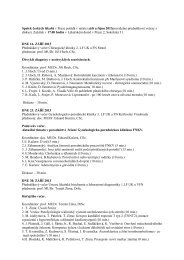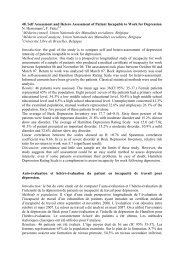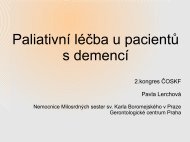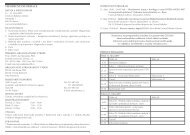ABSTRACTS â ORAL PRESENTATIONS - AMCA, spol. s r.o.
ABSTRACTS â ORAL PRESENTATIONS - AMCA, spol. s r.o.
ABSTRACTS â ORAL PRESENTATIONS - AMCA, spol. s r.o.
You also want an ePaper? Increase the reach of your titles
YUMPU automatically turns print PDFs into web optimized ePapers that Google loves.
In summary, our results demonstrated that combination of RGZ with oxaliplatin may be<br />
more effective then single drug treatment in both sensitive and resistant colon cancer<br />
cells. Thus, this combination seems to be promising in the treatment of colon cancer<br />
cells resistant to oxaliplatin.<br />
Acknowledgement<br />
This work was supported by grant of Internal Grant Agency of Ministry of Health of the<br />
Czech Republic No. NT 11201-5/2010, grant Czech Science Foundation No. P301/11/1730<br />
and FNUSA-ICRC European Regional Development Fund No. CZ.1.05/1.1.00/02.0123.<br />
P32. SYNTHETIC LETHALITY OF CHK1 INHIBITION AND DNA DAMAGE IN NORMAL<br />
AND TUMOR CELL LINES<br />
Tereza Suchánková 1 , Ondřej Hylse 2 , Kamil Paruch 2,3 , Zuzana Pernicová 1,3 , Alois Kozubík 1,4 ,<br />
Karel Souček 1,3<br />
1<br />
Academy of Sciences of the Czech Republic, Institute of Biophysics, Královopolská 135,<br />
61265 Brno, Czech Republic.<br />
2<br />
Department of Chemistry, Faculty of Science, Masaryk University, Brno, Czech Republic.<br />
3<br />
International Clinical Research Center, St. Anne‘s University Hospital Brno, Brno, Czech<br />
Republic<br />
4<br />
Department of Experimental Biology, Masaryk University, Faculty of Science, Brno,<br />
Czech Republic.<br />
Correspondence to: suchankovatereza@ibp.cz, ksoucek@ibp.cz<br />
Progress in understanding of the pathways affected by cancer specific mutations lead<br />
to novel therapeutic approach called the concept of synthetic lethality. Components of<br />
DNA damage response pathway were identified as suitable targets of synthetic lethal<br />
interactions with commonly lost tumor suppressor genes such as p53. Loss of tumor<br />
suppressor gene alone may not change the response to genotoxic stress induced by<br />
chemotherapy. However, the inhibition of a second pathway involved in a synthetic lethal<br />
interaction with this lost suppressor can result in a dramatic difference in sensitivity to<br />
treatment. In this context, the promising druggable targets are kinases regulating the<br />
cell cycle checkpoints.<br />
Checkpoint kinase 1 (CHK1) is an essential serine/threonine kinase that responds to<br />
DNA damage. CHK1 inhibitors sensitize tumors to a variety of DNA-damaging agents in<br />
preclinical models and are being evaluated in clinical trials. SCH 900776 was identified as<br />
a potent and selective CHK1 inhibitor (Guzi et al., 2011).<br />
In our work, we proved the hypothesis of synthetic lethality using inhibitors of CHK1 in<br />
combination with pre-treatment by gemcitabine and hydroxyurea in vitro in normal and<br />
tumor cells. Our results indicate that these inhibitors enable to reduce the concentration<br />
of chemotherapeutics to obtain the same growth inhibition. The most significant<br />
sensitization was observed in human prostate cancer cell lines PC3 and DU-145. The<br />
effect was also achieved in tumorigenic prostate cells BPH-1 CAFTD03, but only transient<br />
effect has occurred in their benign counterparts. Further, using the same amount of drug<br />
Analytical Cytometry VII 125








